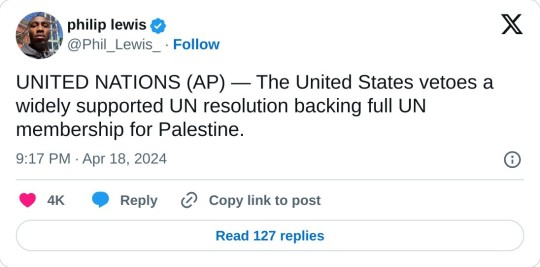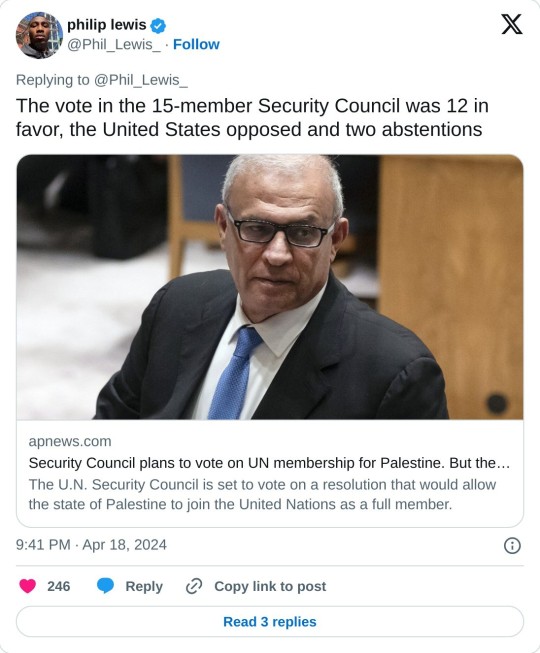#u.n. membership
Text
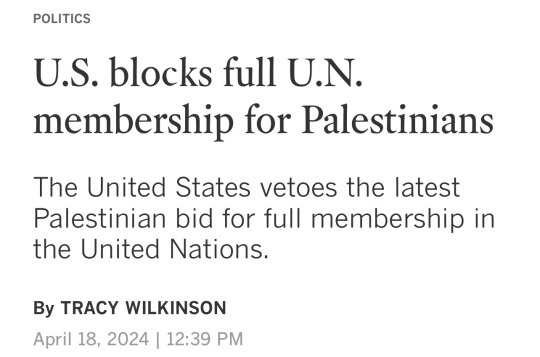
The United States vetoed a widely backed U.N. resolution Thursday that would have paved the way for full United Nations membership for Palestine, a goal the Palestinians have long sought and Israel has worked to prevent.
The vote in the 15-member Security Council was 12 in favor, the United States opposed and two abstentions, from the United Kingdom and Switzerland. U.S. allies France, Japan and South Korea supported the resolution. (source) (source) (source)
After the vetoed U.N. membership vote, the Palestinian Ambassador, Riyad Mansour, gave an emotional speech demanding Palestinian statehood. Vanessa Frazier, the Security Council President from Malta, can be seen wiping a tear from her eye. (more)
#politics#palestine#gaza#israel#palestinian statehood#un#united nations#u.n.#self governance#palestinian state#🇵🇸#human rights#un membership#u.n. membership
2K notes
·
View notes
Text
The U.S. will use its veto power against a Palestinian bid to be recognized as a member state of the United Nations during a vote at the Security Council expected to take place Thursday evening.
Vedant Patel, principal deputy spokesperson for the State Department, described as premature an effort by the Palestinian Authority (PA) to gain member status at the U.N.
He said there was not unanimity among the Security Council’s 15 members that the Palestinian Authority had met the criteria for membership, with unresolved questions over the governance of the Gaza Strip, where Israel is in a war to defeat and eliminate the controlling power, Hamas.
“And for that reason, the United States is voting no on this proposed Security Council resolution,” Patel said.
Earlier it was revealed that the United States was secretly pressuring other members of the Security Council to shoot down a Palestinian state membership so the US wouldn't have to use its veto as that would lead to a wave of local and international criticism for Joe Biden.
#yemen#jerusalem#tel aviv#current events#palestine#free palestine#gaza#free gaza#news on gaza#palestine news#news update#war news#war on gaza#palestinian state#two state solution#united nations#security council#joe biden
12K notes
·
View notes
Text
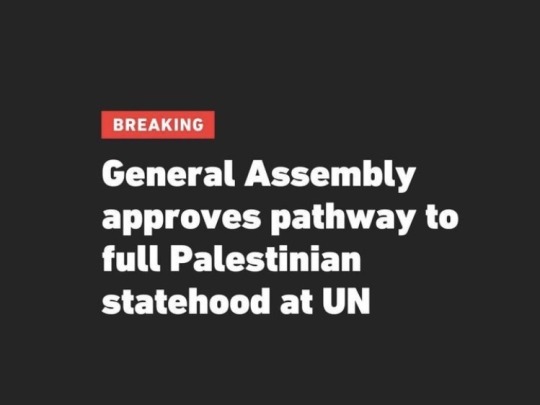
BY EDITH M. LEDERER
Updated 11:35 AM EDT, May 10, 2024
Share
UNITED NATIONS (AP) — The U.N. General Assembly voted by a wide margin on Friday to grant new "rights and privileges" to Palestine and called on the Security Council to favorably reconsider its request to become the 194th member of the United Nations.
The 193-member world body approved the Arab and Palestinian sponsored resolution by a vote of 143-9 with 25 abstentions.
The United States vetoed a widely backed council resolution on April 18 that would have paved the way for full United Nations membership for Palestine, a goal the Palestinians have long sought and Israel has worked to prevent.
U.S. deputy ambassador Robert Wood made clear on Thursday that the Biden administration opposed the assembly resolution. The United States was among the nine countries voting against it, along with Israel.
#social justice#current events#human rights#palestine news#news on gaza#free palestine#gaza#free gaza#palestine#gaza strip#gaza genocide#save gaza#gazaunderattack#important#freepalastine🇵🇸#free palastine#from the river to the sea palestine will be free#israel#un#united nations#palestine 🇵🇸#all eyes on rafah#rafah#keep eyes on rafah#political#political posting#politics#world politics#yemen#tel aviv
352 notes
·
View notes
Text
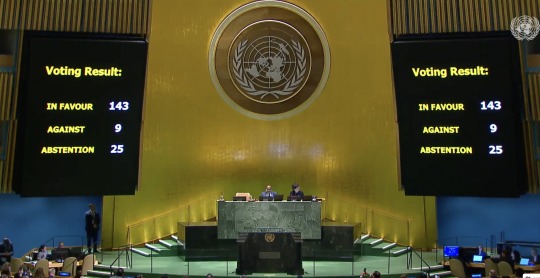
BREAKING: The U.N. General Assembly voted by a wide margin to grant new rights to the state of Palestine and called on the Security Council to revive its membership bid.
How #UNGA members voted on #Palestine :
UN votes symbolically in favor of Palestinian membership
The United Nations general assembly approved the Arab and Palestinian-sponsored resolution by a vote of 143-9 with 25 abstentions. The United States voted against the resolution, along with Israel, Argentina, Czechia, Hungary, Micronesia, Nauru, Palau and Papua New Guinea.
9 against:
US, Israel, Argentina, Czechia, Hungary, Micronesia, Nauru, Palau and Papua New Guinea
قائمة الدول تشمل التسعة الرهط المفسدين الذين صوتوا ضد منح السلطة الفلسطينية #فلسطين عضوية كاملة في الأمم المتحدة..ربنا ينتقم منكم و معكم 25 امتنعوا أيضا.
update:
Here are some of the changes in status that Palestine will have a right to later this year:
To be seated among Member States in alphabetical order
Make statements on behalf of a group
Submit proposals and amendments and introduce them
Co-sponsor proposals and amendments, including on behalf of a group
Propose items to be included in the provisional agenda of the regular or special sessions and the right to request the inclusion of supplementary or additional items in the agenda of regular or special sessions
The right of members of the delegation of the State of Palestine to be elected as officers in the plenary and the Main Committees of the General Assembly
Full and effective participation in UN conferences and international conferences and meetings convened under the auspices of the General Assembly or, as appropriate, of other UN organs.
UN General Assembly presses Security Council to give ‘favourable consideration’ to full Palestinian membership | UN News
#palestine#UNGA#gaza#UN#rafah#united nations#ryan guzman#taylor swift#anti zionisim#CNN#news#breaking news#us news source#NPR#Eurovision 2024#BoycottPureGym#investigation#FridayFeeling#prince harry#Invictus Games#david tennant#baftas#bafta 2024#eurovision#c4news#bethlehem#ethnic cleansing#doctor who
117 notes
·
View notes
Text
EDITH M. LEDERER at AP, via NewsNation:
UNITED NATIONS (AP) — The United States vetoed a widely backed U.N. resolution on Thursday that would have paved the way for full United Nations membership for the state of Palestine.
The vote in the 15-member Security Council was 12 in favor, the United States opposed and two abstentions.
The resolution would have recommended that the 193-member General Assembly, where there are no vetoes, approve Palestine becoming the 194th member of the United Nations. Some 140 countries have already recognized the state of Palestine, so its admission would have been approved.
This is the second Palestinian attempt to become a full member of the United Nations, and it comes as the war in Gaza, now in its seventh month, has put the more than 75-year-old Israeli-Palestinian conflict at center stage.
Before the vote, U.S. deputy State Department spokesman Vedant Patel said the United States has “been very clear consistently that premature actions in New York — even with the best intentions — will not achieve statehood for the Palestinian people.”
Palestinian membership “needs to be the outcome of the negotiation between Israel and the Palestinians,” U.S. deputy ambassador Robert Wood said. It “is something that would flow from the result of those negotiations.”
Anything that gets in the way “makes it more difficult to have those negotiations” and doesn’t help move toward a two-state solution where Israel and Palestine live side by side in peace, which “we all want,” Wood told reporters.
Palestinian President Mahmoud Abbas first delivered the Palestinian Authority’s application for U.N. membership to then-Secretary-General Ban Ki-moon in 2011. That initial bid failed because the Palestinians didn’t get the required minimum support of nine of the Security Council’s 15 members.
The Palestinians then went to the General Assembly and by more than a two-thirds majority succeeded in having their status raised from a U.N. observer to a non-member observer state in November 2012. That opened the door for the Palestinian territories to join U.N. and other international organizations, including the International Criminal Court.
The Palestinians revived their bid for U.N. membership in early April, backed by the 140 countries that have recognized Palestine as an independent state.
This is such a disgraceful decision by the Biden Administration vetoing making the State of Palestine a full UN member.
#United Nations#Biden Administration#UN Security Council#United States#Palestine#Israel#Israel Apartheid State#Palestine UN Membership
34 notes
·
View notes
Text
UN votes to grant new rights to Palestine and revive membership bid | AP News
"While Friday’s resolution gives Palestine some new rights and privileges, it reaffirms that it remains a non-member observer state without full U.N. membership and the right to vote in the General Assembly or at any of its conferences. And the United States has made clear that it will block Palestinian membership and statehood until direct negotiations with Israel resolve key issues, including security, boundaries and the future of Jerusalem, and lead to a two-state solution."
#ap news#associated press#us news#united states news#us news source#united nations#un#the un#the united nations#palestine#free palestine#free gaza#gaza#israel
24 notes
·
View notes
Text
The myth of Russian humiliation
Looking back over the past quarter-century, it isn’t easy to name a Western policy that can truly be described as a success. The impact of Western development aid is debatable. Western interventions in the Middle East have been disastrous.
But one Western policy stands out as a phenomenal success, particularly when measured against the low expectations with which it began: the integration of Central Europe and the Baltic States into the European Union and NATO. Thanks to this double project, more than 90 million people have enjoyed relative safety and relative prosperity for more than two decades in a region whose historic instability helped launch two world wars.
These two “expansions,” which were parallel but not identical (some countries are members of one organization but not the other), were transformative because they were not direct leaps, as the word “expansion” implies, but slow negotiations. Before joining NATO, each country had to establish civilian control of its army. Before joining the European Union, each adopted laws on trade, judiciary, human rights. As a result, they became democracies. This was “democracy promotion” working as it never has before or since.
But times change, and the miraculous transformation of a historically unstable region became a humdrum reality. Instead of celebrating this achievement on the 25th anniversary of the fall of the Berlin Wall, it is now fashionable to opine that this expansion, and of NATO in particular, was mistaken. This project is incorrectly “remembered” as the result of American “triumphalism” that somehow humiliated Russia by bringing Western institutions into its rickety neighborhood. This thesis is usually based on revisionist history promoted by the current Russian regime — and it is wrong.
For the record: No treaties prohibiting NATO expansion were ever signed with Russia. No promises were broken. Nor did the impetus for NATO expansion come from a "triumphalist" Washington. On the contrary, Poland's first efforts to apply in 1992 were rebuffed. I well remember the angry reaction of the U.S. ambassador to Warsaw at the time. But Poland and others persisted, precisely because they were already seeing signs of the Russian revanchism to come.
When the slow, cautious expansion eventually took place, constant efforts were made to reassure Russia. No NATO bases were placed in the new member states, and until 2013 no exercises were conducted there. A Russia-NATO agreement in 1997 promised no movement of nuclear installations. A NATO-Russia Council was set up in 2002. In response to Russian objections, Ukraine and Georgia were, in fact, denied NATO membership plans in 2008.
Meanwhile, not only was Russia not "humiliated" during this era, it was given de facto "great power" status, along with the Soviet seat on the U.N. Security Council and Soviet embassies. Russia also received Soviet nuclear weapons, some transferred from Ukraine in 1994 in exchange for Russian recognition of Ukraine's borders. Presidents Clinton and Bush both treated their Russian counterparts as fellow "great power" leaders and invited them to join the Group of Eight — although Russia, neither a large economy nor a democracy, did not qualify.
During this period, Russia, unlike Central Europe, never sought to transform itself along European lines. Instead, former KGB officers with a clearly expressed allegiance to the Soviet system took over the state in league with organized crime, seeking to prevent the formation of democratic institutions at home and to undermine them abroad. For the past decade, this kleptocratic clique has also sought to re-create an empire, using everything from cyberattacks on Estonia to military invasions of Georgia and now Ukraine, in open violation of that 1994 agreement — exactly as the Central Europeans feared.
Once we remember what actually happened over the past two decades, as opposed to accepting the Russian regime’s version, our own mistakes look different. In 1991, Russia was no longer a great power in either population or economic terms. So why didn’t we recognize reality, reform the United Nations and give a Security Council seat to India, Japan or others? Russia did not transform itself along European lines. Why did we keep pretending that it had? Eventually, our use of the word “democracy” to describe the Russian political system discredited the word in Russia itself.
The crisis in Ukraine, and the prospect of a further crisis in NATO itself, is not the result of our triumphalism but of our failure to react to Russia’s aggressive rhetoric and its military spending. Why didn’t we move NATO bases eastward a decade ago? Our failure to do so has now led to a terrifying plunge of confidence in Central Europe. Countries once eager to contribute to the alliance are now afraid. A string of Russian provocations unnerve the Baltic region: the buzzing of Swedish airspace, the kidnapping of an Estonian security officer.
Our mistake was not to humiliate Russia but to underrate Russia’s revanchist, revisionist, disruptive potential. If the only real Western achievement of the past quarter-century is now under threat, that’s because we have failed to ensure that NATO continues to do in Europe what it was always meant to do: deter. Deterrence is not an aggressive policy; it is a defensive policy. But in order to work, deterrence has to be real. It requires investment, consolidation and support from all of the West, and especially the United States. I’m happy to blame American triumphalism for many things, but in Europe I wish there had been more of it.
20 notes
·
View notes
Text
Big day tomorrow for Palestine at the UNGA
The United Nations General Assembly could vote on Friday on a draft resolution that would recognize the Palestinians as qualified to become a full U.N. member and recommend that the U.N. Security Council "reconsider the matter favorably."
It would effectively act as a global survey of how much support the Palestinians have for their bid
https://www.reuters.com/world/middle-east/palestinians-seek-un-general-assembly-backing-full-membership-2024-05-07/
It's the only reasonable way towards a two-state solution and to correct historical mistakes.
#palestine#palestinians#gaza#rafah#west bank#genocide#israeli atrocities#israeli apartheid#israeli occupation#idf terrorists#iof terrorism#war crimes#free palestine#free gaza#justice#mass graves#right wing extremism#forced displacement#dispossession#annexation#illegal settlements#illegal occupation#two state solution#state of palestine#support for palestine#settler colonialism#international law#unga#un membership
15 notes
·
View notes
Text
“Possibly, in this meeting, we can already consensually decide which new countries can join BRICS,” Lula told international journalists in the capital, Brasilia. “I am of the opinion that as many countries want to enter, if they are in compliance with the rules we are establishing, we will accept the countries’ entrance.”
Lula’s comments came hours after Reuters reported that Brazil has resisted expanding the group’s membership. It quoted unidentified Brazilian diplomats as voicing concern that adding more nations could lessen the influence of the existing members.[...]
He has rejected the U.S. and EU’s shared position of supporting Ukraine in its fight against Russia’s invasion, refusing to provide arms to Ukranian forces and pushing for peace talks to bring the war to an end.
He has called for an end to the dominance of the U.S. dollar in international trade and supported a common currency for commerce within the South American bloc Mercosur and for trade among BRICS nations. He has also taken swipes at the International Monetary Fund.
Lula repeated those positions Wednesday.
“Why does Brazil need the dollar to trade with China or Agentina? We can trade in our currency,” he said.
He went on to hail the prospects of the Chinese-backed New Development Bank, commonly known as the BRICS bank, which is funding infrastructure projects in Brazil and elsewhere in the developing world.
“The BRICS bank must be effective and more generous than the IMF. Which is to say, the bank exists to help save countries and not to help sink countries, which is what the IMF does many times,” he said.
Lula also criticized the U.N. Security Council, saying its members have been responsible for starting wars despite the body’s stated mission of maintaining peace and security. Brazil has been seeking a permanent seat on the council for decades.
2 Aug 23
33 notes
·
View notes
Text
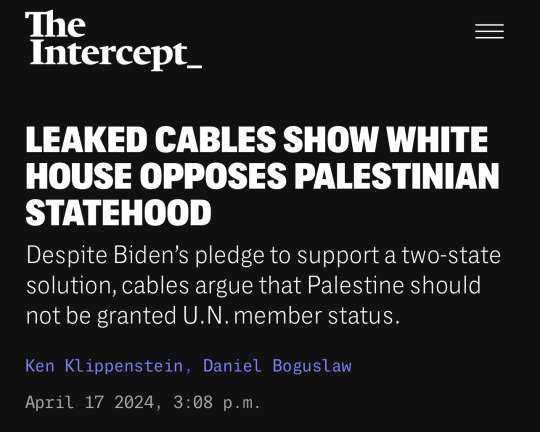
AHEAD OF THE United Nations Security Council action to consider the Palestinian Authority’s application to become a full member of the international body, the United States is lobbying nations to reject such membership, hoping to avoid an overt “veto” by Washington. The lobbying effort, revealed in copies of unclassified State Department cables obtained by The Intercept, is at odds with the Biden administration’s pledge to fully support a two-state solution.
The diplomatic cables detail pressure being applied to members of the Security Council, including Malta, the rotating president of the council this month. Ecuador in particular is being asked to lobby Malta and other nations, including France, to oppose U.N. recognition. The State Department’s justification is that normalizing relations between Israel and Arab states is the fastest and most effective way to achieve an enduring and productive statehood.
While clarifying that President Joe Biden has worked vigorously to support “Palestinian aspirations for statehood” within the context “of a comprehensive peace that would resolve the Israeli-Palestinian conflict,” a diplomatic cable dated April 12 details U.S. talking points against a U.N. vote for Palestinian statehood. The cable says that Security Council members must be persuaded to reject any proposal for Palestinian statehood — and thereby its recognition as a sovereign nation — before the council’s open debate on the Middle East, scheduled for April 18.
“It remains the U.S. view that the most expeditious path toward a political horizon for the Palestinian people is in the context of a normalization agreement between Israel and its neighbors,” the cable reads. “We believe this approach can tangibly advance Palestinian goals in a meaningful and enduring way.”
“We therefore urge you not to support any potential Security Council resolution recommending the admission of ‘Palestine’ as a U.N. member state, should such a resolution be presented to the Security Council for a decision in the coming days and weeks.”
(continue reading)
#politics#palestine#gaza#israel#two state solution#rafah#palestinian statehood#un#united nations#🇵🇸#neoliberalism#centrism#u.n.#2 state solution#un membership#u.n. membership
171 notes
·
View notes
Text

AHEAD OF THE United Nations Security Council action to consider the Palestinian Authority’s application to become a full member of the international body, the United States is lobbying nations to reject such membership, hoping to avoid an overt “veto” by Washington. The lobbying effort, revealed in copies of unclassified State Department cables obtained by The Intercept, is at odds with the Biden administration’s pledge to fully support a two-state solution.
In 2012, the U.N. General Assembly passed a resolution granting Palestine the status of a non-member observer state.
The diplomatic cables detail pressure being applied to members of the Security Council, including Malta, the rotating president of the council this month. Ecuador in particular is being asked to lobby Malta and other nations, including France, to oppose U.N. recognition. The State Department’s justification is that normalizing relations between Israel and Arab states is the fastest and most effective way to achieve an enduring and productive statehood.
While clarifying that President Joe Biden has worked vigorously to support “Palestinian aspirations for statehood” within the context “of a comprehensive peace that would resolve the Israeli-Palestinian conflict,” a diplomatic cable dated April 12 details U.S. talking points against a U.N. vote for Palestinian statehood. The cable says that Security Council members must be persuaded to reject any proposal for Palestinian statehood — and thereby its recognition as a sovereign nation — before the council’s open debate on the Middle East, scheduled for April 18.
“It remains the U.S. view that the most expeditious path toward a political horizon for the Palestinian people is in the context of a normalization agreement between Israel and its neighbors,” the cable reads. “We believe this approach can tangibly advance Palestinian goals in a meaningful and enduring way.”
“We therefore urge you not to support any potential Security Council resolution recommending the admission of ‘Palestine’ as a U.N. member state, should such a resolution be presented to the Security Council for a decision in the coming days and weeks.”
#yemen#jerusalem#tel aviv#current events#palestine#free palestine#gaza#free gaza#news on gaza#palestine news#news update#war news#war on gaza#palestinian state#genocide joe#joe biden#united nations#security council#two state solution
6K notes
·
View notes
Text
by LYN JULIUS
Following revelations that the U.N.’s Palestinian refugee agency UNRWA colluded with Hamas in Gaza, 12 countries have withdrawn or paused their funding to the agency at time of writing, with more likely to come. However, there is little discussion as to why an agency set up as a temporary measure to aid refugees from Israel’s 1948 War of Independence should still be giving relief to the descendants of Arab refugees 75 years later.
Interestingly, it is not generally known that UNRWA was actually established to help refugees on both sides of the conflict—both Arab and Jewish. Initially, UNRWA defined those for whom it was responsible as “a needy person who, as a result of the war in Palestine, has lost his home and his means of livelihood.”
This definition included some 17,000 Jews who had lived in areas of then-Palestine conquered by Arab forces during the 1948 war and around 50,000 Arabs living within Israel’s armistice frontiers. Israel took responsibility for these individuals and by 1950 they were removed from the UNRWA rolls. This left some 550,000 Palestinian Arabs—according to a New York Times estimate in Dec. 1948—under UNRWA’s authority.
At the time, there was no internationally recognized definition of what constituted a refugee. In 1951, the U.N. Refugee Convention agreed on the following definition:
A person who owing to a well-founded fear of being persecuted for reasons of race, religion, nationality, membership of a particular social group or political opinion is outside the country of his nationality and is unable or, owing to such fear, is unwilling to avail himself of the protection of that country; or who, not having a nationality and being outside the country of his former habitual residence as a result of such events, is unable or, owing to such fear, is unwilling to return to it.
This definition certainly applies to the 850,000 Jewish refugees who fled persecution in Arab countries after 1948 and mostly made their way to Israel. Returning to those countries would have and still does put their lives at risk.
The burden of rehabilitating and resettling the 650,000 of these refugees who arrived in Israel was shouldered by the Jewish Agency and American Jewish relief organizations, such as the American Jewish Joint Distribution Committee. Together with Holocaust survivors from Eastern Europe, they were shunted into transit camps called ma’abarot in appalling conditions.
At the time, the American aid earmarked for Middle East refugees was supposed to have been split evenly between Israel and the Arab states, with each side receiving $50 million. The money to take in the Arab refugees was handed over to UNRWA, while the United States gave another $53 million for “technical cooperation” to the Arab countries. Thus, in effect, the Arab nations received double the money given to Israel even though Israel took in more refugees, a large number of whom had been expelled from Arab countries.
16 notes
·
View notes
Text
Leaked Cables Show “War Criminal White House” Opposes Palestinian Statehood
Despite Biden’s Pledge to Support a Two-State Solution, Cables Argue That Palestine Should Not Be Granted U.N. Member Status.
— Ken Klippenstein, Daniel Boguslaw | April 17, 2024 | The Intercept
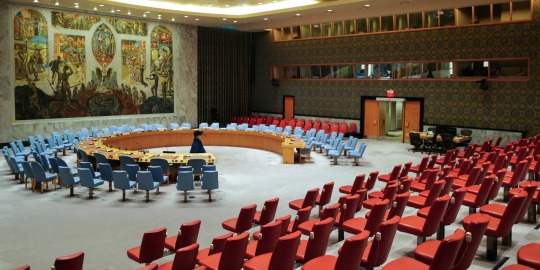
An empty United Nations Security Council room ahead of a meeting on the situation in the Middle East, in NYC on April 14, 2024. Photo: Charly Triballeau/AFP via Getty Images
Ahead Of The United Nations Security Council action to consider the Palestinian Authority’s application to become a full member of the international body, the United States is lobbying nations to reject such membership, hoping to avoid an overt “veto” by Washington. The lobbying effort, revealed in copies of unclassified State Department cables obtained by The Intercept, is at odds with the Biden administration’s pledge to fully support a two-state solution.
In 2012, the U.N. General Assembly passed a resolution granting Palestine the status of a non-member observer state.
The diplomatic cables detail pressure being applied to members of the Security Council, including Malta, the rotating president of the council this month. Ecuador in particular is being asked to lobby Malta and other nations, including France, to oppose U.N. recognition. The State Department’s justification is that normalizing relations between Israel and Arab states is the fastest and most effective way to achieve an enduring and productive statehood.
While clarifying that President Joe Biden has worked vigorously to support “Palestinian aspirations for statehood” within the context “of a comprehensive peace that would resolve the Israeli-Palestinian conflict,” a diplomatic cable dated April 12 details U.S. talking points against a U.N. vote for Palestinian statehood. The cable says that Security Council members must be persuaded to reject any proposal for Palestinian statehood — and thereby its recognition as a sovereign nation — before the council’s open debate on the Middle East, scheduled for April 18.
“It remains the U.S. view that the most expeditious path toward a political horizon for the Palestinian people is in the context of a normalization agreement between Israel and its neighbors,” the cable reads. “We believe this approach can tangibly advance Palestinian goals in a meaningful and enduring way.”
“We therefore urge you not to support any potential Security Council resolution recommending the admission of ‘Palestine’ as a U.N. member state, should such a resolution be presented to the Security Council for a decision in the coming days and weeks.”
Experts say that without a unanimous Security Council vote, any vote from the U.N. General Assembly is largely symbolic.
“Like it or not, a General Assembly vote on this issue is of political rather than legal weight,” Richard Gowan, the International Crisis Group’s U.N. director, told The Intercept. “The Assembly can only accept a new state ‘on the recommendation’ of the Security Council.”
The diplomatic cable includes a rationale for the administration’s opposition to the vote, citing the risk of inflaming tensions, political backlash, and potentially leading to the U.S. Congress cutting U.N. funding.
“Premature actions at the UNSC, even with the best intentions, will achieve neither statehood nor self-determination for the Palestinian people. Such initiatives will instead endanger normalization efforts and drive the parties further apart, heighten the risk of violence on the ground that could claim innocent lives on both sides, and risk support for the new, reform government announced by President Abbas,” the cable says.
Asked about the cable and whether its opposition to U.N. recognition of Palestinian statehood contradicts the Biden administration’s position in support of a two-state solution, the State Department did not respond at the time of publication.
“The U.S. position is that the Palestinian state should be based on bilateral agreements between the Israelis and Palestinians,” Gowan said. “It does not believe that the UN can create the state by fiat.”
A second cable dated April 13 sent from the U.S. Embassy in Quito, Ecuador, relays Ecuadorian Foreign Minister Gabriela Sommerfeld’s agreement with the United States that Palestine should not be recognized for statehood. In cooperation with the United States, according to the cable, Sommerfeld instructed Ecuador’s permanent representative to the United Nations José De La Gasca to lobby Japan, Korea, and Malta (all rotating members of the Security Council) to reject the proposal. Lobbying of permanent member France is also mentioned.
Sommerfeld agreed, according to the cable, that “It was important any proposed resolution fail to achieve the necessary votes without a U.S. veto.” The cable says, “Ecuador would not want to appear isolated (alone with the United States) in its rejection of a ‘Palestine’ resolution (particularly at a time when the most UN member states are criticizing Ecuador over its April 5 incursion into Mexico’s embassy in Quito).” Ecuador finds itself in an escalating conflict with Mexico over its decision to arrest the former Ecuadorian vice president inside the Mexican Embassy.
Asked about the second cable, the State Department and the Ecuadorian Embassy in Washington did not respond to requests for comment.
With its yearlong seat on the powerful 15-member Security Council, Ecuador holds outsized influence to vote against the Palestinian proposal for recognition.
“This really shows the extent to which the [Ecuadorian President Daniel] Noboa administration is beholden to the United States,” Guillaume Long, senior fellow at the D.C.-based Center for Economic and Policy Research and former foreign minister of Ecuador, told The Intercept when shown the cable. “On top of this, it is quite shocking to see the United States, which condemned Ecuador’s April 5 storming of the Mexican embassy and its violation of international law … making the most of Ecuador’s isolation in the hemisphere to get it to do its bidding. Ecuador is just buying its way out of its crimes by committing more crimes. Truly shocking,” said Long, referring to Ecuador’s rejection of Palestinian membership in the U.N.
After the publication of this story, the Ecuadorian government released the following statement, which reads as translated: “Regarding the alleged leaks published by a digital portal, the Ecuadorian Foreign Ministry denies the veracity of its content. The foreign policy of the National Government, including its actions as a non-permanent member of the UN Security Council, is clear, adhered to the principles of international law, public and transparent, as is all participation of the country and its authorities in different international forums. Citizens are called to obtain information only through official means.”
Since 2011, the U.N. Security Council has rejected the Palestinian Authority’s request for full member status. On April 2, the Palestinian Observer Mission to the U.N. requested that the council once again take up consideration of its membership application. According to the first State Department cable, U.N. meetings since the beginning of April suggest that Algeria, China, Guyana, Mozambique, Russia, Slovenia, Sierra Leone, and Malta support granting Palestine full membership to the U.N. It also says that France, Japan, and Korea are undecided, while the United Kingdom will likely abstain from a vote.
“It is important that all Security Council members hear at this stage of the process that a number of members have questions that require further study about the Palestinian Authority’s formal request for UN membership through the Council, and that if a vote is forced on the issue, you will join the United States and not support approval of the application,” the cable reads.
#War Criminal | United States 🇺🇸#Leaked Cables | “War Criminal White House”#Opposes | Palestinian Statehood#— Ken Klippenstein | Daniel Boguslaw#Palestine 🇵🇸 | Should Not Be Granted | United Nations 🇺🇳 | Member Status
5 notes
·
View notes
Text
The United States vetoed a widely backed U.N. resolution Thursday that would have paved the way for full United Nations membership for Palestine, a goal the Palestinians have long sought and Israel has worked to prevent.
The vote in the 15-member Security Council was 12 in favor, the United States opposed and two abstentions, from the United Kingdom and Switzerland. U.S. allies France, Japan and South Korea supported the resolution.
The strong support the Palestinians received reflects not only the growing number of countries recognizing their statehood but almost certainly the global support for Palestinians facing a humanitarian crisis caused by the war in Gaza, now in its seventh month.
The resolution would have recommended that the 193-member U.N. General Assembly, where there are no vetoes, approve Palestine becoming the 194th member of the United Nations. Some 140 countries have already recognized Palestine, so its admission would have been approved, likely by a much higher number of countries.
U.S. deputy ambassador Robert Wood told the Security Council that the veto “does not reflect opposition to Palestinian statehood but instead is an acknowledgment that it will only come from direct negotiations between the parties.”
4 notes
·
View notes
Text
At the end of August, some 70 youth were detained in Nigeria’s southern Delta state, accused of organizing a same-sex wedding. Another 76 people were detained in October for organizing a similar event in the northeastern Gombe state. These mass detentions seem to send a clear message: LGBT people are less welcome than ever in Nigeria, the most populous state in Africa, at nearly 240 million inhabitants.
That is certainly how it seems to Francis Ndimele. Only a month after the mass arrest in August, which made headlines, he forced to emigrate from his home in Lagos to the United States. “My parents disowned me in 2020 after discovering I was gay. I had the support of an LGBTQI+ group that gave me shelter in Lagos. Despite this, my family kept sending police officers to chase me. They believe my sexual identity is an embarrassment to the family, especially since they are clergymen from an apostolic church. And the Nigerian police use the arrest of LGBT+ people for extortion, knowing that the law does not protect us,” the 24-year-old says, bitterly.
In 2014, the then-president of Nigeria, Goodluck Ebele Jonathan, enacted legislation banning same-sex relationships, as well as any public display of same-sex affection or membership of LGBTQ+ groups. The law imposes a penalty of up to 14 years in jail for anyone who “enters into a same-sex marriage contract or civil union,” and sentences up to 10 years in jail anyone who “registers, operates, or participates in gay clubs, societies, and organizations” or who even supports said groups. Nigerian lawyers and human rights activists argue that the draconian law is a violation of basic universal freedoms, and that the police regularly use it to make arbitrary arrests, and even to torture arrestees.
Lagos-based lawyer Chizelu Emejulu defends LGBT people in different Nigerian states. He says, “It seems that [the anti-LGBT law] was only passed in order to harass and extort.” It is an instrument of the government “to suppress democracy,” he says. Emejulu points out that no one has been convicted in the African country since the homophobic law came into effect a decade ago, and says that all the individuals who were arrested during the most recent raid were released on bail, although the court has ordered them to appear every month since. No charges have yet been brought against them.
Nigerian police applied the law for the first time in 2019, when they processed 47 men for “public show of same-sex amorous relationship,” according to human rights organizations like Human Rights Watch, although that case was dismissed because the prosecution did not present any witnesses in court.
In January, the United Nations Commission on Human Rights joined critics of the law with its Universal Periodic Review, a periodic review that analyzes the state of human rights around the world every four and a half years. The U.N. recommended that the Nigerian government withdraw the anti-homosexuality law, the liberation of anyone who had been arrested based on their sexual orientation and the end of persecution of the LGBT community, according to Human Rights Watch, which warns that this kind of recommendation has “little to no impact” on these kinds of issues.
Parades of humiliation
Human rights activists have also raised the alarm over Nigeria’s latest group arrests being paired with a humiliating police tactic: pre-trial media parades of detainees. The Nigerian Supreme Court declared in 2022 that this practice violates the Constitution, but during last August’s arrest, the police operation was streamed live on social media, as has been the case with most homophobic arrests.
Lawyer Stephen Okiroro stresses that these practices go against Section 36 of the Nigerian Constitution, which guarantees the presumption of innocence. “Public parading of suspects by Nigerian security agents was common during the military era, when the repressive military government suspended several human rights laws. Now we have a democratic government, and one of its values is fundamental human rights,” he says.
Only 22 of the 54 African countries allow same-sex relationships. Although in Nigeria, the law establishes prison sentences, in 12 of the country’s 36 states where Sharia (Islamic law) is in force, the death penalty can be applied to members of the LGBT community or to those who go against traditional norms of behavior. In November, local media reported the arrest of eight young men for “immoral dress.” The accusation: dressing in garments considered to be women’s clothing. The punishment: three months in prison and 10 lashes. “Transvestism” is being targeted by the federal government, warn organizations such as Human Rights Watch. In April, a legislator introduced an amendment to the law against same-sex marriage that imposes penalties of six months’ imprisonment or fines of 500,000 naira ($513).
The privilege to flee
Those who can, escape this suffocating environment. “I had already planned to travel and had my visa, but I got help from human rights advocates to pay for my flight reservation to the United States, where I now consider myself safe,” says Ndimele, the young man persecuted by his relatives. “My parents are happy that I am no longer around and that their church members can no longer make fun of them.” Daniel Orji, who lived in the southwestern Nigerian state of Ogun, also left the country after being fired from his job. “A colleague saw me in a gay venue when I was on vacation, took pictures of me on the sly and sent them to the office. They fired me and asked me never to come back, under threat of reporting me. I got a job in the U.K. and moved about six months ago,” he says. “[In Nigeria] we face all kinds of discrimination from people at work and in all other social encounters. I feel very sorry for those who can’t travel like me. It’s really hellish.”
Ndimele and Orgi were lucky to be able to flee the country, but leaving isn’t an option for everyone. One of the people who don’t have that privilege is Kunle Adeagbo, who says he has been detained and extorted on various occasions. “I live in fear. The law doesn’t just allow the police to treat LGBT people in an inhumane way, it also subjects us to mob violence. I was once injured in the street on the way to a party. But it was hard for me to go and report it at the police station because of the stigmatization and discrimination committed by those who are supposed to protect the lives and property of citizens.” Adeagbo eventually worked up the courage to report his assailants, but the accusation backfired. “The police detained me, tortured me, kept me in custody and forced me to confess that I’m gay. They only released me after I paid them,” he says. “We are not asking for very much, we just want the violence to stop so that human rights defenders and organizations that provide services to LGBT people can freely support us.”
The spokesperson for the Nigerian police force, Muyiwa Adejobi, did not respond to calls or text messages sent by this publication. The Nigerian Minister of Justice did not respond to questions, either.
A law that violates the Constitution
Benjamin Abiboye, human rights lawyer, says that Article 40 of the Nigerian Constitution states that every citizen has the right to freely assemble and associate with others, and in particular, form or belong to political parties, unions or any other association to protect their interests. “So, why should the anti-LGBT law punish people for gathering peacefully? Why should the government look the other way when there is mob violence against them?” he asks. The law Nigeria passed in 2014 “is the most repressive law passed since the return of democracy to the country in 1999,” he says. Okiroro agrees: “Freedom of association is a fundamental human right in a functioning democracy, and it is essential that the government provide space for people to express different views and defend their common interests.”
In addition to violating the Nigerian Constitution, the homophobic law also violates international human rights agreements, like the African Charter on Human and Peoples’ Rights, which guarantees the right to freedom of expression, freedom of association, freedom of assembly and the equality of all people. The International Covenant on Civil and Political Rights, which Nigeria assented to with reservations in 1993, assures the equality of all people before the law and their right to not suffer from discrimination.
5 notes
·
View notes
